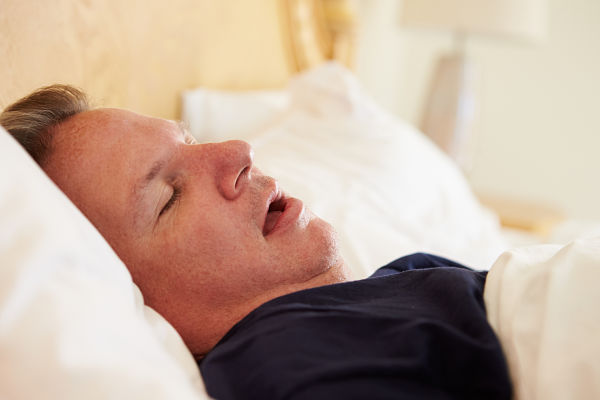Obstructive sleep apnoea and your hormones

Obstructive sleep apnoea (OSA) is a condition in which breathing stops involuntarily for brief periods of time during sleep. Periods when breathing stops are called apnoea. Symptoms include loud snoring, gasping or choking noises, waking suddenly with palpitations, extreme tiredness on waking, morning headaches and daytime sleepiness.
OSA is reported to affect around 3% of people generally and over 20% of those with central obesity especially if the weight gain is mainly in the abdomen. It typically occurs as we fall asleep or enter into a period of REM sleep and happens when:
- the muscles in the back of your throat relax
- the airways narrow or close as you breath in
- your breathing is impaired such that your oxygen levels lower and your carbon dioxide levels build up
OSA is not to be taken lightly, it can lead to:
- Breathing complications after surgery due to certain medications or anaesthetics making your OSA worse
- High blood pressure
- Increased risk of coronary problems and stroke
- Memory problems and poor concentration
- Mood swings or depression
- Increased inflammation
- Oxidative stress - where there is an imbalance between the free radicals in the body and the antioxidants available to fight them
What is the link between OSA and your hormones?
The link between obstructive sleep apnoea (OSA) and your hormones appears to work in two ways
FIRSTLY: Endocrine conditions can negatively affect obesity and the stability and anatomy of your upper airways. Endocrine conditions that have known links to OSA include:
Cushing’s Syndrome – described here – a condition which includes weight gain around the neck and fat pads at both sides of the neck above the collarbone
Acromegaly – described here - a condition that includes enlargement if the soft tissues in the larynx and pharynx. About 40% of Acromegaly patients experience OSA
Prader –Willi syndrome – described here - a condition which typically leads to obesity.
Some studies also suggest that hypothyroidism can lead to or worsen OSA but that this improves with L-T4 treatment such as Levothyroxine
SECONDLY: OSA symptoms can impact upon the production and secretion of hormones which then leads to the development of endocrine conditions
This includes insulin resistance - described here
We also know that OSA can affect the levels of melatonin in your body and this in turn can have a negative effect on bone metabolism which is particularly demonstrated in the elderly and osteoporosis.
OSA may also affect the levels of the hunger hormone – ghrelin, the satiety hormone – leptin and orexin the mediator of appetite. This in turn can prompt increased hunger and calorie intake making obesity even more of a problem. This then becomes a vicious cycle.
It is believed that disrupted sleep also impedes the cyclic secretion of testosterone which can then lead to low libido and vitality in men. This, in addition to a high BMI is likely to be responsible for hypogonadism which I describe in this blog post
Diagnosis and treatment of OSA
If you are concerned that you have OSA – or your partner has said they believe you have the condition – you should go to your GP. They will ask about your symptoms, health and medical history and you will be referred to a sleep specialist or sleep clinic if they suspect you have OSA
If the diagnosis is subsequently confirmed, you are likely to be advised to make lifestyle changes such as
- losing weight
- exercising more
- stopping smoking
- reducing alcohol
- actively addressing sleep problems
If your OSA is judged to be severe you may also be advised to use a CPAP machine which pumps air through a mask worn at night.
Those with mild or moderate OSA may be advised to or wear a mandibular advancement device (MAD) which brings forward the lower jaw and keeps the upper airway open.
I hope this has been helpful.
Although every effort is made to ensure that all health advice on this website is accurate and up to date it is for information purposes and should not replace a visit to your doctor or health care professional.
As the advice is general in nature rather than specific to individuals Dr Vanderpump cannot accept any liability for actions arising from its use nor can he be held responsible for the content of any pages referenced by an external link










